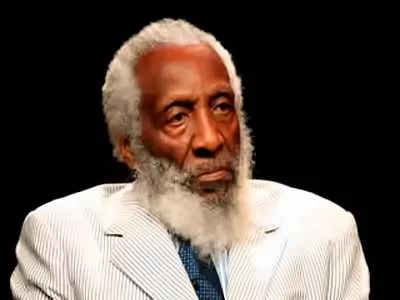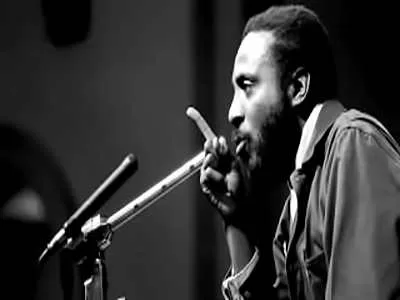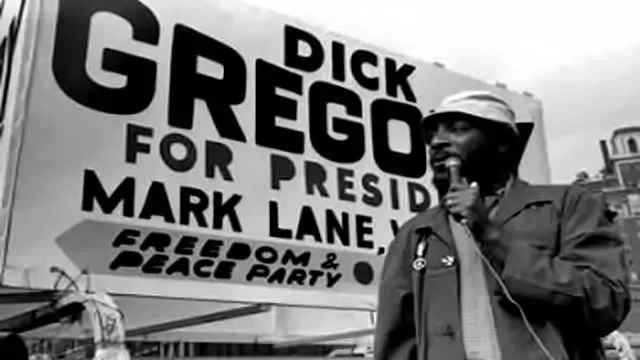Today marks what would have been Dick Gregory’s 85th birthday, a poignant reminder of a man whose life was a tapestry woven with humor, activism, and controversy. Gregory, who passed away earlier this year, was not just a comedian; he was a multifaceted individual whose contributions to society spanned various fields. From stand-up comedy to civil rights activism, Gregory’s legacy is as complex as it is inspiring.
Multifaceted Life of Dick Gregory
Dick Gregory was a trailblazer in many respects. He was a comedian, actor, writer, speaker, civil rights activist, social critic, and entrepreneur. His career began in the 1960s, a time when America was grappling with issues of race, war, and inequality. Gregory’s comedy was groundbreaking; he was one of the first black comedians to address racism openly and candidly on stage. His humor was not just for laughs; it was a vehicle for social change.

Gregory’s ability to cross over from all-black audiences to mixed and predominantly white audiences was unprecedented. He became the first black performer to sit on the famous sofa of “Tonight Starring Jack Paar,” a significant milestone that paved the way for future black entertainers. His insistence on being treated equally in the entertainment industry was a bold statement during a time of segregation and discrimination.
A Voice for Change
Beyond comedy, Gregory was deeply involved in political activism. He was one of the first celebrities to engage in the political movements of the 1960s, protesting against racial injustice, the Vietnam War, and economic inequality. His commitment to social justice was evident in his willingness to go on hunger strikes and face arrest for his beliefs. In fact, he was barred from performing in Australia due to fears that he would incite protests.

In 1967, Gregory ran for Mayor of Chicago, and in 1968, he made a historic bid for the presidency as a write-in candidate for the Freedom and Peace Party. Although he did not win, he garnered tens of thousands of votes, demonstrating the impact of his voice in the political arena. His campaign even included a publicity stunt where his image was printed on dollar bills, leading to a humorous yet serious commentary on the value of representation in America.
Controversial Side
While Gregory’s contributions to comedy and activism are commendable, his legacy is not without controversy. He dabbled in conspiracy theories, suggesting that federal agents were behind the assassinations of prominent figures like John F. Kennedy, Malcolm X, and Martin Luther King Jr. He also claimed that the federal government was responsible for blowing up the levees in New Orleans during Hurricane Katrina and expressed skepticism about the moon landings.
These views, while reflective of a deep-seated distrust in government, often lacked rigorous evidence. For instance, Gregory’s assertion that there is no gravity on the moon is a misunderstanding of basic physics. The moon has about one-sixth of Earth’s gravity, and the lunar landscape is illuminated by the sun, allowing for shadows to be cast. Such misconceptions highlight the importance of critical thinking, even among those who are otherwise insightful and intelligent.
The Good and the Bad
It is essential to recognize that individuals can embody both admirable qualities and significant flaws. Gregory’s passion for social justice and his willingness to endure personal sacrifice for his beliefs are commendable. He fought for women’s rights and stood against injustices, even when it was unpopular or dangerous to do so. However, his forays into conspiracy theories and questionable health claims, including the promotion of dubious weight-loss products, complicate his legacy.
In the realm of health and nutrition, Gregory’s claims often lacked scientific backing. His ventures into the wellness industry have been criticized as “profitable rot,” raising concerns about the potential dangers of promoting unverified health products. This aspect of his life serves as a cautionary tale about the importance of evidence-based practices, especially in health-related matters.
A Lasting Impact
Despite his controversies, Dick Gregory’s impact on American culture and society is undeniable. He was a pioneer who used his platform to address critical issues, challenge societal norms, and inspire change. His humor, while often sharp and biting, was rooted in a desire for a better world. Gregory’s legacy serves as a reminder that the fight for social justice is ongoing and that every voice matters.
As we remember Dick Gregory on this significant date, we also acknowledge the broader context of October 12. This day is not only a celebration of Gregory’s life but also coincides with various observances, including Laos Liberation Day, Free Thought Day, and Columbus Day (also known as Discovery Day). It is a day that honors the complexities of history and the diverse narratives that shape our world.
Conclusion: Embracing Complexity
In remembering Dick Gregory, we embrace the complexity of his life and legacy. He was a man of contradictions, a comedian who tackled serious issues, and an activist who sometimes strayed into controversial territory. As we reflect on his contributions, let us celebrate the good while acknowledging the bad, understanding that no individual is entirely one thing or another.
In a world that often demands black-and-white thinking, Gregory’s life encourages us to embrace nuance. He reminds us that we can admire someone’s achievements while also critiquing their shortcomings. As we honor his memory, let us carry forward his passion for justice, his commitment to truth, and his unwavering belief in the power of laughter to effect change.

